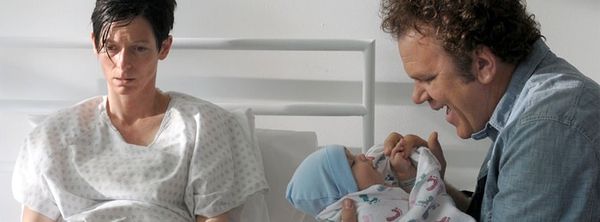Eye For Film >> Movies >> We Need To Talk About Kevin (2011) Film Review
We Need To Talk About Kevin
Reviewed by: Jennie Kermode

Why do kids kill other kids? Should we blame the parents? Are some children simply born evil, and what do we really mean when we talk about childhood innocence anyway? These are questions that lie at the heart of key social debates, yet we rarely tackle them head on, and they are surprisingly absent from literature.
On its release, Lionel Shriver's novel We Need To Talk About Kevin was feted for taking on the notion of the Bad Mother that is pivotal to this conversation, interwoven with moral panics about teen sexuality and abuse of the welfare system. Her central character, Eva, is older, has a loving husband and owns a successful business - the ideal position in which to start a family, many would say - but are some women simply not cut out to be mothers at all?

Lynne Ramsay's adaptation of the book perfectly matches its intimacy, too close for comfort for some, and manages to make aspects of it even darker. This approach is a bit hit and miss - there's a danger of creating a more conventional horror movie from something wide-reaching in its concerns - and this is not helped by the attendant publicity campaign. But Ramsay's imagery, her short, staggered scenes and her off-kilter camerawork are anything but conventional. She circumvents the difficulty involved in telling an 18-year long tale by lifting us out of linear narrative into a fractured world interwoven with vivid splashes of red. The opening scene, at a tomato festival, recalls the best work of Jarman or Russell; the red brings us back to the ugliness and viscerality of birth, then to petty acts of violence, and onward to Kevin's violent destiny which, by contrast, is stark and plain and clean.
To reveal that Kevin is a killer detracts nothing from the story; it's an awareness we have throughout. Eva (Tilda Swinton in her strongest performance to date) visits him in prison, flashing back to the horror of discovery. The most genuinely distressing moments in the film stem from her loneliness and the social exclusion she experiences, the hatred of those who blame her for her son's acts.
We don't see quite enough of Kevin's loneliness for the film to balance as the book did; instead Ramsay emphasises similarities between the characters that suggest it is only through her suffering that Eva can hope to reach a place from which she and her son can communicate honestly. This is her journey, the character arc disguised behind intolerable sameness. In several scenes we are not immediately sure whether it is Eva or Kevin we are seeing; in others they seem to merge. If one is carrying the guilt of the other, it's hard to pinpoint quite where that guilt began.
All three boys who play Kevin at different stages of his life are excellent, but the standout is Rock Duer as the frustrated toddler unwilling to engage in pointless play. It is through his impressive physical performance that the film hints Kevin may have a personality disorder - but what would that mean anyway, beyond putting a label on him? The doctor's unwillingness to oblige deprives Eva of this small comfort.
John C Reilly as Eva's husband Franklin is an inspired piece of casting. He may not look like the character described in the book but he plays him to perfection, all fatherly warmth and working class solidity in contrast to Eva's chill. His previous role in Henry: Portrait Of A Serial Killer draws out from the viewer the sense that nobody is safe from going down Kevin's road, and it also recalls that film's grittiness, its ordinariness, in mundane landscapes Ramsay uses with similar skill. These techniques blend to show us that there is nothing special about murder, nothing particularly different. Then there's Celie, the daughter, underwritten in the book and no more fleshed out here, but Ramsay makes that seem appropriate, another indication of Eva's obsession with her son.
We Need To Talk About Kevin is not an enjoyable film. Just like that endlessly deferred conversation, it's something from which we may instinctively turn away; yet it carries a similar note of compulsion. This is something we need to talk about because, Ramsay implies, its roots are in every one of us.
Reviewed on: 17 Oct 2011


















